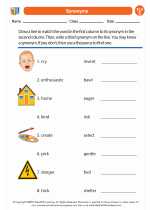Synonyms/Antonyms
Synonyms are words that have a similar meaning to another word. For example, "happy" and "glad" are synonyms because they both convey the same idea of being pleased or content. Antonyms, on the other hand, are words that have opposite meanings. For instance, "hot" and "cold" are antonyms because they represent completely different temperature characteristics.
Synonyms
To find synonyms, it's helpful to consider words that have the same or similar meaning. Here are a few examples:
- Fast: swift, quick, rapid
- Happy: joyful, content, pleased
- Big: large, huge, immense
When looking for synonyms, it's important to understand the context in which the words are used, as some synonyms may have slightly different nuances in meaning.
Antonyms
Antonyms are words that have opposite meanings. Here are some examples:
- Hot: cold
- Big: small
- Happy: sad
Understanding synonyms and antonyms can help improve vocabulary and language skills. It allows for more varied and expressive communication, both in speaking and writing. To further reinforce this knowledge, here are some study tips and practice exercises:
Study Tips
- Make flashcards with a word on one side and its synonym or antonym on the other. Quiz yourself regularly to reinforce your memory.
- Read extensively to encounter a wide range of synonyms and antonyms in context.
- Use a thesaurus to explore different synonyms and antonyms for common words.
Practice Exercises
Use the following sentences to find synonyms and antonyms:
- The cat is fast as it chases the mouse.
- We were all happy to hear the good news.
- The big elephant was difficult to miss at the zoo.
- After playing in the snow, the children were cold and shivering.
Identifying and understanding synonyms and antonyms is an essential part of building a strong vocabulary and effective communication skills.
[Synonyms/Antonyms] Related Worksheets and Study Guides:
.◂English Language Arts Worksheets and Study Guides Fifth Grade. Synonyms/Antonyms
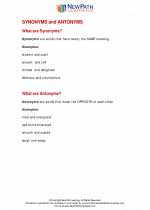
 Worksheet/Answer key
Worksheet/Answer key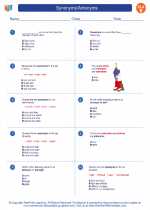
 Worksheet/Answer key
Worksheet/Answer key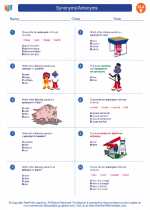
 Worksheet/Answer key
Worksheet/Answer key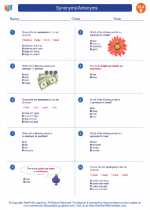
 Worksheet/Answer key
Worksheet/Answer key